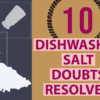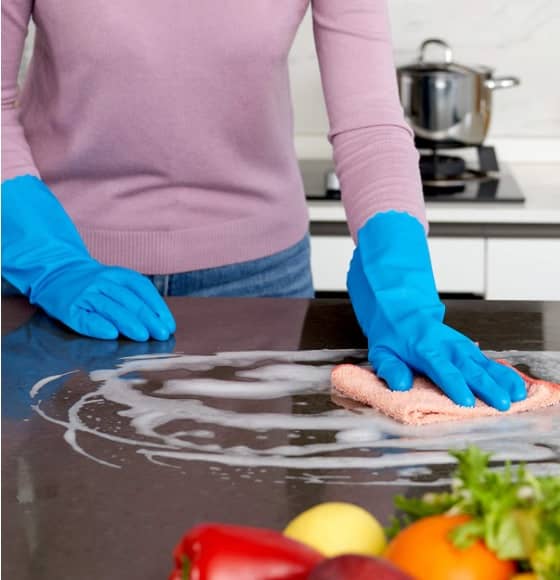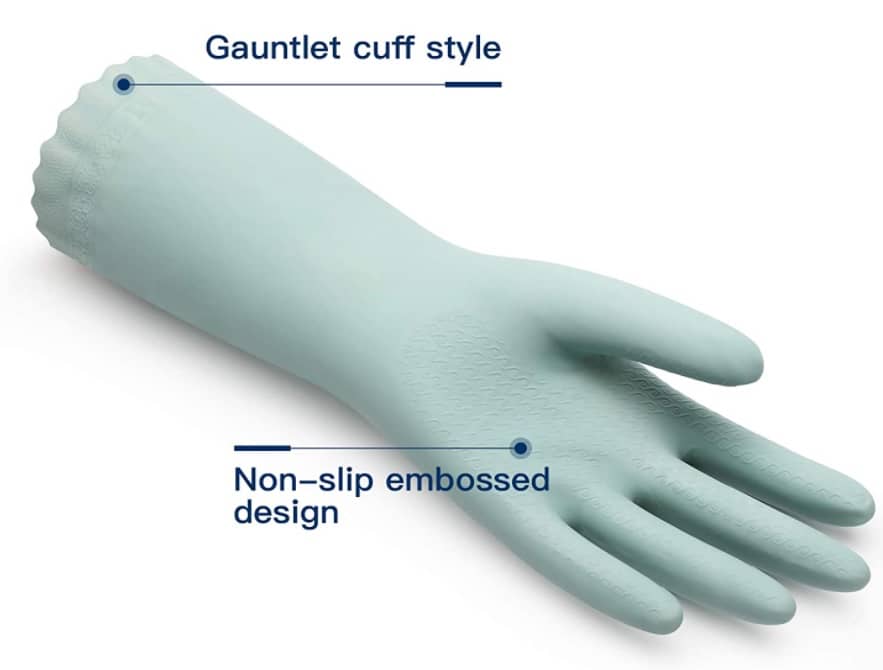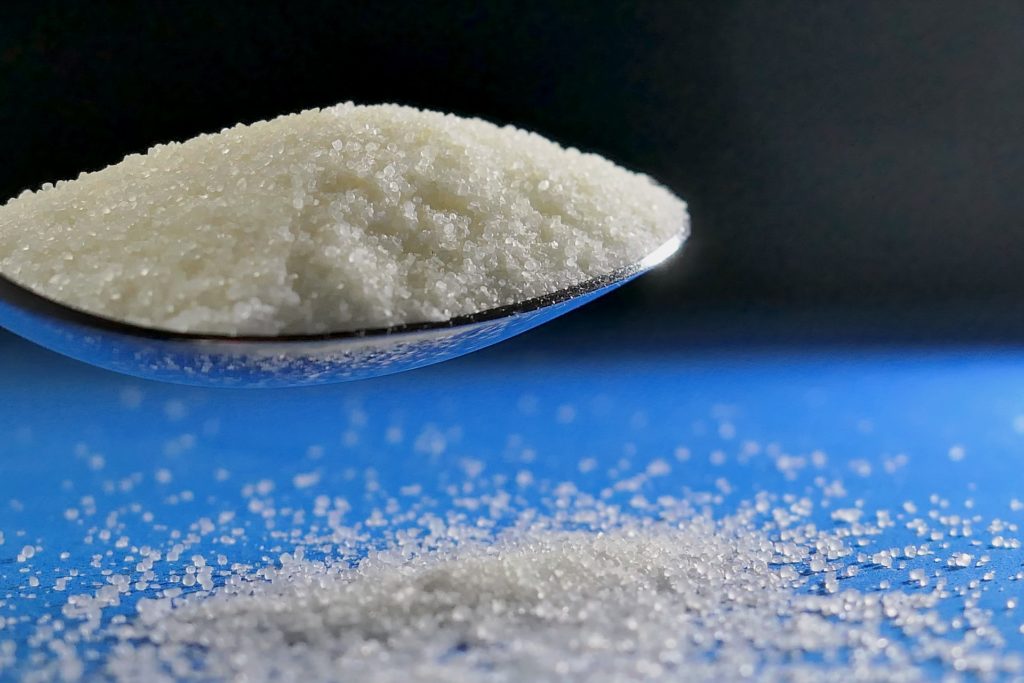
Hard water gives your dishes white films and spots. Whereas soft water is ideal for dishwashing. The dishwasher salt helps the dishwasher water softener to transform the hard water into soft. Thus, with the aid of dishwasher salt, you will get clean and spot-free pots and pans (Only if you put the dishwasher in the right salt setting – read along to know more).
Clearly, to get spotless dishes, a dishwasher salt is as important as a detergent. But not for every dishwasher owner. Learning how the dishwasher salt works, will let you figure out a lot about the dishwashing process, the dos, and the don’ts.
You will also learn about the built-in water softener and the perfect salt setting to put your dishwasher in.
After reading this article, you will be able to answer these questions:
- Why do you put salt in a dishwasher?
- How a dishwasher salt intensifies a good clean wash of your dishes?
- When and who can skip the salt?
- What are some common misconceptions regarding the dishwasher salt?
Top 10 Dishwasher Salt-Related Doubts Resolved
1. Detailed: What does dishwasher salt do in the water softener unit?
Either you can keep your dishwasher salt light flashing or you need to fill the salt section. But to decide what is the right thing to do, you need to understand what actually a dishwasher salt does.
As mentioned above, we use a dishwasher salt to transform the hard water into soft water. Hard water has calcium and magnesium ions that leave white stains in your dishes.
To make the hard water soft, the water softener swaps those calcium and magnesium ions, in the water (Ca++ and Mg++) with safer Sodium ions (Na+).
The softener gets the sodium ions from resin particles (which are already present in the dishwasher water softening unit).
But as the resin particles have some limited number of sodium ions, soon they will run out of Na+.
Here comes the function of the dishwasher salt, as it is the cheapest source of Na+.
Do I need dishwasher salt in a soft water area?
No, obviously you don’t. The dishwasher salt makes hard water soft. So, if you already have soft water in your tap, then dishwasher salt can be skipped entirely.
I have illustrated some very easy steps to help you understand how the salt helps the softener in transforming hard water into soft.
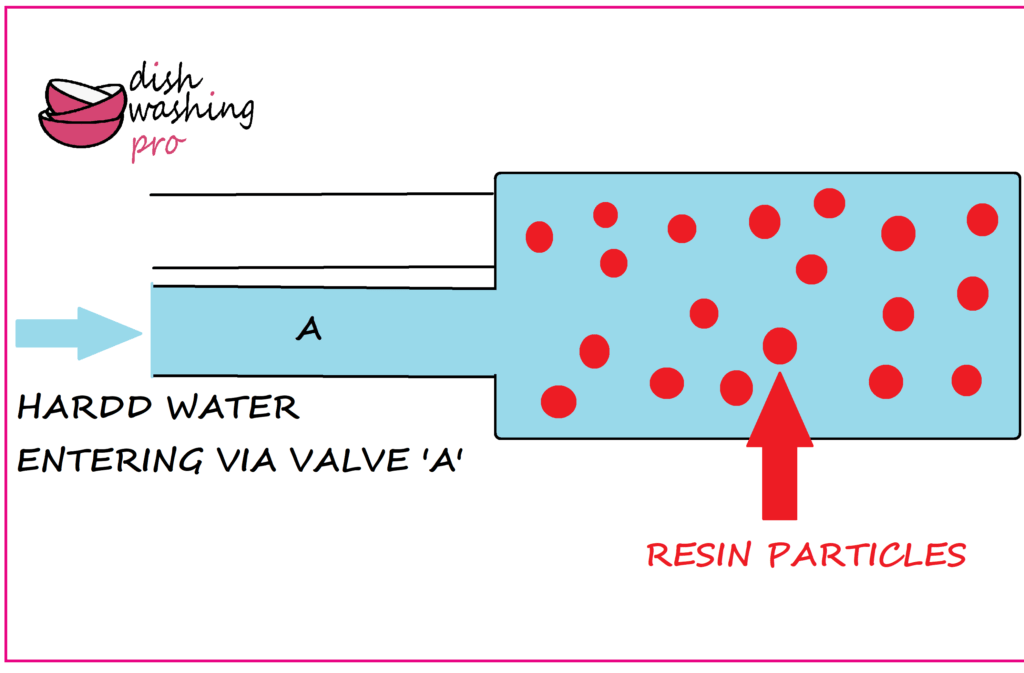
1. When you press the start button of your dishwasher, the valve A opens up, and hard water starts to pour in, into the container where resin particles are stored.
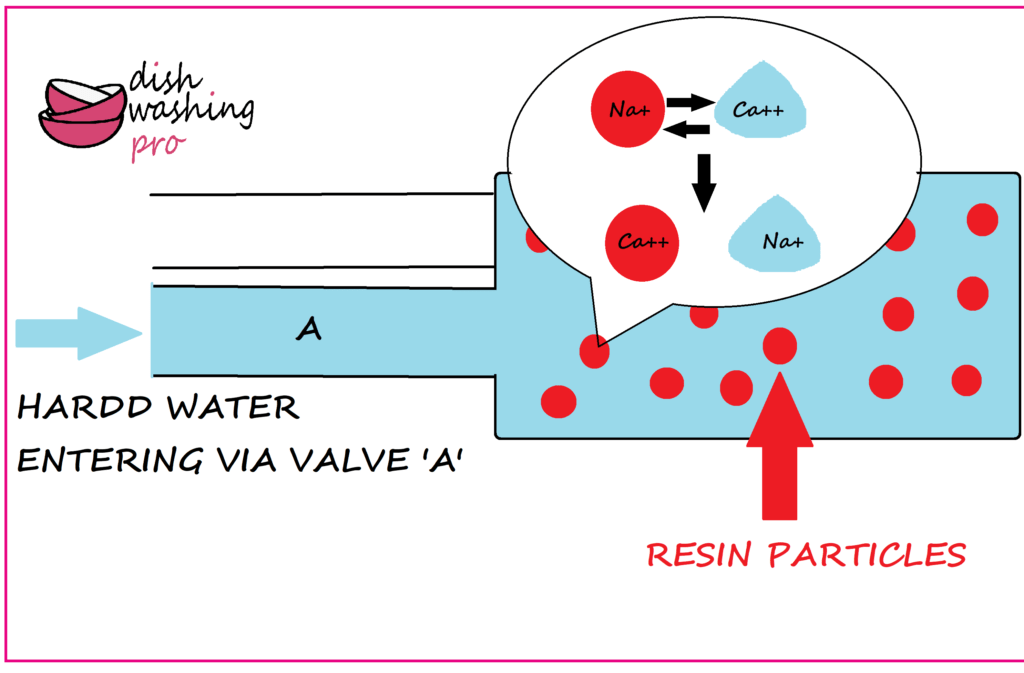
2. Hard ions like Ca++ and Mg++ come into contact with the resin particles stored in the softener.
And ion-exchange starts to take place. One Ca++ ion got replaced by two Na+ ions of the resin particles.
Now, Ca++ ions are attached to the resin beads. The water is left with harmless sodium or Na+ ions hence turned into soft water.
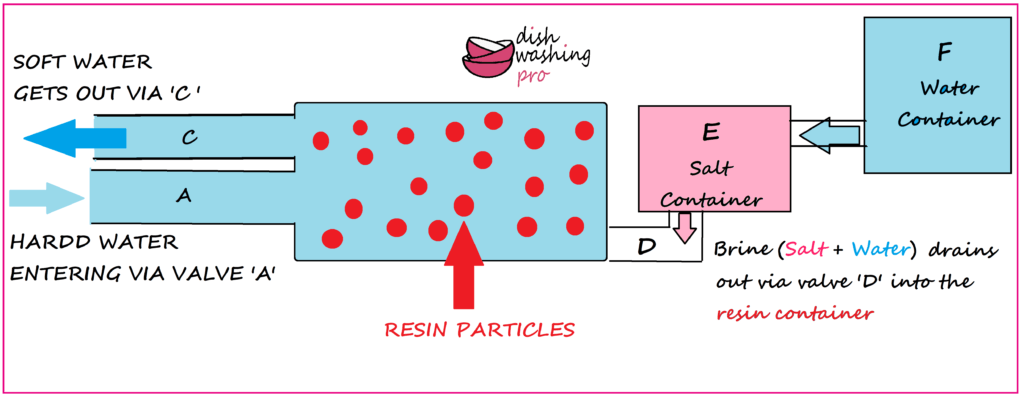
3. The soft water then comes out of the valve C. However, depending upon the level of water hardness the resin particles may run out of sodium ions sooner or later.
That’s why you need to put salt in the dishwasher. There is a water container ‘F’ from where water comes out into the salt container ‘E’ and makes brine which is nothing but a concentrated salt solution.
Then the brine via the valve ‘D’ outlets into the container of the resin particles. The salt solution then comes into contact with the resin particles.

4. Again, ion exchange starts and the Ca++ and Mg++ ions in the resin particles get replaced by sodium ions of the brine.
Now, the water solution attached with hard ions, outlets from the resin container/dishwasher via ‘A’ valve.
The dishwasher is left with newly generated resin particles which are now ready to swap hard ions and make the water soft again.
2. Do I Need Dishwasher Salt?
Is it necessary to use dishwasher salt?
Clearly, the need for the dishwasher salt varies from one person to another, depending on the quality of the water you have in your house.
I have hard water issues and that is why I need dishwasher salt to keep my dishes spot-free. Check these symptoms to know if your water is hard or soft.
Read: Is Dishwasher Rinse Aid Necessary or a Marketing Gimmick?
You can skip the dishwasher salt in two cases:
Situation 1: Sometimes, even if you have a built-in water softener in your dishwasher and a salt container, you can skip the dishwasher salt. Let the salt light keep flashing if your tap water is soft. Read this to know if your water is hard or soft.
Situation 2: In case, your home has an external water softener unit, which transforms the hard water of your entire home into soft then, you can skip the salt for obvious reasons.
3. How much salt do I put in my dishwasher for the first time?
You need to fill the salt container, until its full. Then set the salt value.
By setting the salt value you will indicate your dishwasher the amount of salt it needs to take for the dishwashing.
Hence filling the entire salt container doesn’t mean, all of the salt is going to be used in one single load.
Setting the correct salt value in your dishwasher:
Depending on the hardness level in your water, you need to set the right amount of salt before running your dishwasher and the softener will take the exact amount to make the water soft.
So, to set up the correct salt setting in your dishwasher you need to know, the exact water hardness level in your water.
Because for your dishwasher water softener to work efficiently it needs an ample amount of salt to regenerate the resin particles.
To know the water hardness value of your tap water you can buy a water hardness test kit as it is the most efficient and affordable way to do the same.
Also, there is a trick that I used in my early dishwashing days when I didn’t know the exact water hardness level. Read here – How to choose the appropriate salt value in your dishwasher when you don’t know the water hardness level?
4. How often should you put salt in a dishwasher?
It depends on the water hardness level, the frequency of using your dishwasher and the number of dishes you are washing each day.
Whenever the salt container runs out of salt, every dishwasher model now comes with an indicator usually in an ‘S’ shape, which will turn on or keep beeping, to let you know that the salt can is empty. So, you don’t have to check manually each time before running a load.
5. Do I need dishwasher salt if I use tablets?
All-in-one tablets are certainly for your convenience but in some cases, you may need to put extra dishwasher salt.
The packaging of the tablets says that up to the water hardness level of 35-degree fH, doesn’t need anything extra to put in the dishwasher and will give you perfect cleaning.
Also, some lab tests have shown that with above 20-degree fH of water hardness level, you need extra salt to remove those stubborn hard water stains from the dishes.
Bottom Line: Run a load with the all-in-one tablet once and see if the dishes are coming out clean or not. If not then put some extra salt. Don’t worry the dishwasher will only use the required amount of salt, hence nothing will get wasted. All you are doing is just testing, to figure out what works for you the best.
6. What kind of salt do you put in a dishwasher?
Salts specifically made for dishwashers known as the dishwasher salt is available in the market.
The dishwasher salt has larger grains to ensure that the salt dissolves at a slower pace to avoid blocking the water softener unit.
Always use a good quality dishwasher salt as the efficiency of the water softener unit largely depends on the quality of the salt.
7. Can you eat dishwasher salt?
Dishwasher salt is very pure NaCl even more than the table salt. But eating it may hit you with a bit of bad luck.
I mean who knows! It might include things that are unhealthy because dishwasher salts are not tested for human consumption. So, why take the risk? Also, table salt is much cheaper.
8. What happens if you put table salt in a dishwasher?
Firstly, table salts are available in the refined version. It means the grains are very fine, which can block the softening unit.
Also, several anticaking agents are included in the table salt which can severely affect the ion exchange process. So, don’t risk your precious dishwasher, just use a good quality dishwasher salt.
9. Is there any dishwasher salt alternative?
The dishwasher salt is large-grained. So, table salt can’t be used but the kosher salt or the rocksalt usually comes with larger grains.
You can give it a shot. I have tried and haven’t found any issue with it.
But I will always recommend you to use a dishwasher salt, as it is manufactured exclusively for the dishwashing purpose, hence will work best.
10. What happens if you don’t put salt in a dishwasher?
If you don’t put salt in a dishwasher, then either it will give you spotty and stained dishes or dishes will come out just fine. Which result you will get depends on your water hardness level.
Usually, if the water hardness level is around 7 grains per gallon or more, then the water is deemed as hard, and putting salt is crucial.
Hard water leaves nasty white films and spots on your dishes. As the dishwasher salt helps your built-in water softener to make the hard water soft, it can be an essential part of your dishwashing.
If your tap water is soft then you don’t need the dishwasher salt. As simple as that.
In case you have a water softener in your house that gives you soft water straight from the tap, then keep the salt light flashing in your dishwasher. Your dishes will come out clean and shiny without the salt.
I have tried to cover all the salt-related queries. You can post your query in the comment section if it is not answered in this article.
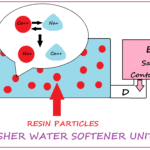








![[Best Dishwasher Detergent] to Prevent Etching Your Glassware etchproof](https://dishwashingpro.com/wp-content/uploads/2020/06/etchproof-100x100.png)

